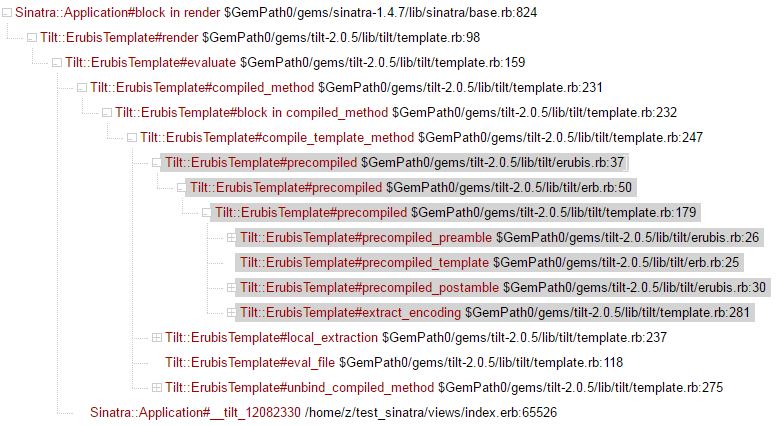跟踪sinatra如何利用tilt进行render
完整trace在末尾
假设有sinatra script如下,有实例变量@a和局部变量b
get '/' do
@a = "Hello, world"
erb(:index, {}, {b: 123})
end模板index.erb为
instance a: <%= @a %>
local b: <%= b %>现跟踪该erb如何运作
sinatra中各种erb、erubis、haml、sass、scss,调用的都是render,render再用tilt来加载相应模板引擎来进行实际的render。于是用trace_tree来跟踪title的render方法
def erb(template, options = {}, locals = {}, &block)
render(:erb, template, options, locals, &block)
end
def render(engine, data, options = {}, locals = {}, &block)
locals = options.delete(:locals) || locals || {}
scope = options.delete(:scope) || self
# ...
begin
#...
require 'trace_tree'
output = binding.trace_tree(html: true, tmp: ['sinatra', 'render.html']) do
template.render(scope, locals, &block)
end
ensure
@default_layout = layout_was
end
# ...
output
end粗略地看,render干的就是两件事:动态定义一个方法,然后执行它,这就返回了填充好的模板了
def evaluate(scope, locals, &block)
locals_keys = locals.keys
if SYMBOL_ARRAY_SORTABLE
locals_keys.sort!
else
locals_keys.sort!{|x, y| x.to_s <=> y.to_s}
end
method = compiled_method(locals_keys)
method.bind(scope).call(locals, &block)
end调用栈如下

compiled_method如下:动态定义方法,方法名含线程id以免重复,方法体是用字符串拼接(用lambda也可以,但这样就不像字符串那样好检查了),然后class_eval生成这个方法,再remove_method,以免污染,最后缓存在@compiled_method
TOPOBJECT = Object.superclass || Object
def compiled_method(locals_keys)
LOCK.synchronize do
@compiled_method[locals_keys] ||= compile_template_method(locals_keys)
end
end
def compile_template_method(local_keys)
source, offset = precompiled(local_keys)
local_code = local_extraction(local_keys)
method_name = "__tilt_#{Thread.current.object_id.abs}"
method_source = String.new
if method_source.respond_to?(:force_encoding)
method_source.force_encoding(source.encoding)
end
method_source << <<-RUBY
TOPOBJECT.class_eval do
def #{method_name}(locals)
Thread.current[:tilt_vars] = [self, locals]
class << self
this, locals = Thread.current[:tilt_vars]
this.instance_eval do
#{local_code}
RUBY
offset += method_source.count("\n")
method_source << source
method_source << "\nend;end;end;end"
Object.class_eval(method_source, eval_file, line - offset)
unbind_compiled_method(method_name)
end
def unbind_compiled_method(method_name)
method = TOPOBJECT.instance_method(method_name)
TOPOBJECT.class_eval { remove_method(method_name) }
method
end加入puts来检查method_source,可见模板如下(去掉头尾的TOPOBJECT.class_eval和end才是真正的方法定义)
TOPOBJECT.class_eval do
def __tilt_12082330(locals)
Thread.current[:tilt_vars] = [self, locals]
class << self
this, locals = Thread.current[:tilt_vars]
this.instance_eval do
b = locals[:b]
begin
__original_outvar = @_out_buf if defined?(@_out_buf)
@_out_buf = _buf = String.new
@_out_buf << 'instance a: '; @_out_buf << ( @a ).to_s; @_out_buf << '
'; @_out_buf << 'local b: '; @_out_buf << ( b ).to_s; @_out_buf << '
';
@_out_buf
ensure
@_out_buf = __original_outvar
end
end;end;end;end中间的@_out_buf那段来自于precompiled

precompiled的实现是一种template pattern,所有XXXTemplate都继承自Template,并重写precompiled(其实也有些是直接重写evaluate的,例如AsciidoctorTemplate,反正Template#render调用的是Template#evaluate,只要接口统一为evaluate就可以,也算是种adapter pattern吧)
module Tilt
class ERBTemplate < Template
#...
if RUBY_VERSION >= '1.9.0'
def precompiled(locals)
source, offset = super
[source, offset + 1]
end
end
end
endTemplate的precompiled会将重写过的precompiled_preamble,precompiled_template,precompiled_postamble拼在一起
def precompiled(local_keys)
preamble = precompiled_preamble(local_keys)
template = precompiled_template(local_keys)
postamble = precompiled_postamble(local_keys)
source = String.new
#...
source << preamble << "\n" << template << "\n" << postamble
[source, preamble.count("\n")+1]
end其中precompiled_template就是模板的生成。例如,ERBTemplate就是这样重写precompiled_template的
module Tilt
class ERBTemplate < Template
#...
def prepare
#...
@engine = ::ERB.new(data, options[:safe], options[:trim], @outvar)
end
def precompiled_template(locals)
source = @engine.src
source
end演示一下平常地使用erb(不过tilt默认用erubis所以刚刚才生成的@_out_buf......不同)
irb(main):010:0> puts ERB.new('a: <%= @a %>').src
#coding:UTF-8
_erbout = ''; _erbout.concat "a: "; _erbout.concat(( @a ).to_s); _erbout.force_encoding(__ENCODING__)
=> nil串联起来,为了能获取实例变量,模板函数要绑定在传入的scope(原Sinatra::Base用dup复制出的self)上执行
method.bind(scope).call(locals, &block)而局部变量,如上所示,作为方法参数传入,而方法体早已用local_extraction写死,得出诸如b = locals[:b]的语句
def local_extraction(local_keys)
local_keys.map do |k|
if k.to_s =~ /\A[a-z_][a-zA-Z_0-9]*\z/
"#{k} = locals[#{k.inspect}]"
else
raise "invalid locals key: #{k.inspect} (keys must be variable names)"
end
end.join("\n")
end至此,模板填充完毕。
完整trace如下
